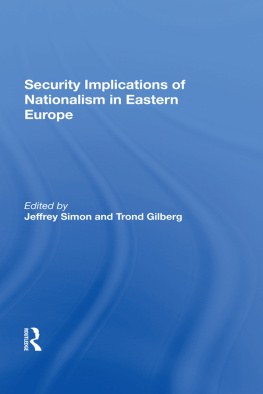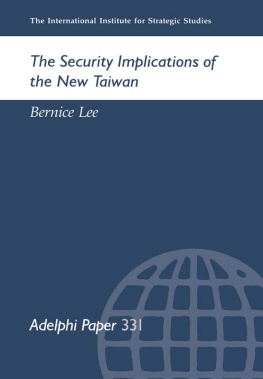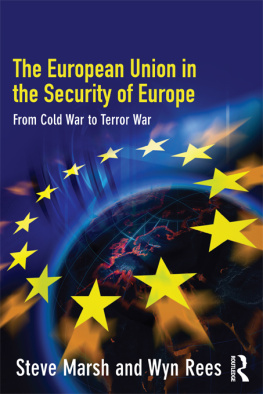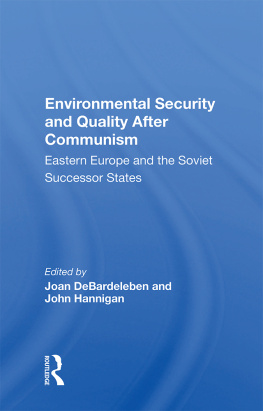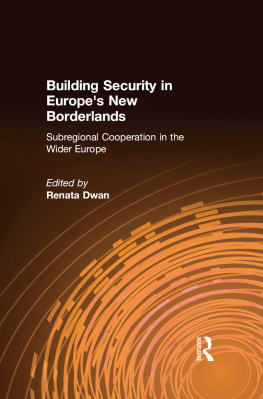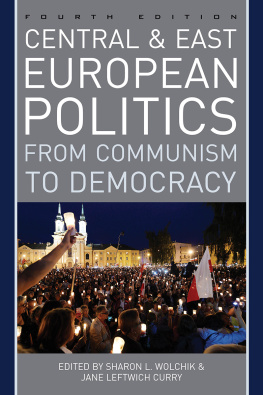Security Implications of Nationalism in Eastern Europe
About the Book and Editors
Suggesting that events in Poland during 19801981 represent the tip of an iceberg, the contributors examine the rise of nationalism in Eastern Europe and its potential consequences for European security. They analyze developing problems and trends in the region, including the cooling of relations between the USSR and individual countries in Eastern Europe, the continuing economic crisis, changing social structures, the influence of the intelligentsia, and the eroding importance of ideology as a key part of Eastern Europes political culture. The second half of the book focuses on the impact of these shifts on political and military relations between the USSR and Eastern European countries and on the efficient functioning of the Warsaw Pact.
Jeffrey Simon is a Soviet threat analyst for the Strategic Studies Institute at the US Army War College. His publications include Warsaw Pact Forces: Problems of Command and Control (Westview, 1985) and Cohesion and Dissension in Eastern Europe: Six Crises (1983). Trond Gilberg is associate director of the Slavic and Soviet Language and Area Center of Pennsylvania State University and was a visiting research professor at the US Army War College in 19831984. He is the author of Modernization in Romania Since World War II (1975).
US Army War College Series on Contemporary Strategic Issues
First published 1986 by Westview Press
Published 2019 by Routledge
52 Vanderbilt Avenue, New York, NY 10017
2 Park Square, Milton Park, Abingdon, Oxon OX14 4RN
Routledge is an imprint of the Taylor & Francis Group, an informa business
Copyright 1986 Taylor & Francis
All rights reserved. No part of this book may be reprinted or reproduced or utilised in any form or by any electronic, mechanical, or other means, now known or hereafter invented, including photocopying and recording, or in any information storage or retrieval system, without permission in writing from the publishers.
Notice:
Product or corporate names may be trademarks or registered trademarks, and are used only for identification and explanation without intent to infringe.
Library of Congress Cataloging in Publication Data
Security implications of nationalism in Eastern Europe.
(US Army War College series on contemporary strategic issues)
Includes index.
1. Europe, EasternNational securityCongresses.
2. Communist countriesCongresses. 3. Nationalism
Europe, EasternHistory20th CenturyCongresses.
I. Simon, Jeffrey. I. Gilberg, Trond, 1940- .
UA646.8.S43 1986 355.033247 85-3316
ISBN 13: 978-0-367-28694-1 (hbk)
Contents
Trond Gilberg and Jeffrey Simon
Hans Heymann, Jr.
Lincoln Gordon
Walter D. Connor
Stephen Fischer-Galati
Woodrow J. Kuhns
Ivan Volgyes
Christopher D. Jones
Jeffrey Simon
Richard C. Martin
Vernon V. Aspaturian
Andrzej Korbonski
George W. Price
Jeffrey Simon and Trond Gilberg
This volume evolved from a conference held in October 1984 sponsored by the Strategic Studies Institute and held at the US Army War College. The conference participants, drawn from both the academic world and government, were brought together to discuss the security implications of nationalism in Eastern Europe.
In this volume thirteen specialists discuss the changing economic, social, political, ideological and cultural environment in Eastern Europe, and analyze the implications for political-military relations in communist polities generally and on the effectiveness of the Warsaw Pact specifically.
A summary of the contributors major points is found in . In the concluding chapter, after considering the diverse and often provocative views of the other contributors, we offer suggestions for US policy in the region.
Our grateful appreciation is extended to LTG Thomas Healy, who was Commandant of the US Army War College when this conference was originally conceived, and to MG James Thompson, the current Commandant. We also would like to acknowledge the participation at the conference of General Richard G. Stilwell, MG William Burns, Ambassador Charles Marthinsen, and Colonel Thomas Stone, Director of the Strategic Studies Institute, who also provided a thoughtful review of the final manuscript.
We gratefully acknowledge the generous support provided by the US Army War College Foundation, Inc., and its Executive Director, Colonel LeRoy Strong, USA (Ret.). Without the Foundations and Colonel Strongs active support, the conference could not have been convened with such a distinguished group of participants. Also, we want to express our appreciation to the conference participants, who took time from their busy schedules to play an active role in the conference. Their perceptive comments helped the contributors to sharpen their arguments for publication. Working with the contributors has been an enjoyable, rewarding experience, and we wish to express our appeciation for their cooperation.
Special thanks are due to Captain Ivan Bolden and Karen Bailey for their assistance during the conference and to Gloria Bush and Shirley Martin whose diligent efforts led to a completed manuscript. As always, the support that we received from the US Army War College Reprographics Division was outstanding. Charles Owens, chief of the Reprographics Division, and Priscilla Alspaugh and Carol Wentzel provided indispensable assistance in preparing this volume in its final form.
Neither this volume nor the individual articles in it should be construed to reflect the official position of the US Army War College, the Strategic Studies Institute, the Department of the Army, or the Department of Defense. The editors alone are responsible for any errors of fact or judgment.
Jeffrey Simon
Carlisle Barracks, PA
Trond Gilberg
University Park, PA
1
Introduction
Trond Gilberg
Jeffrey Simon
During the 1960s and 1970s, nationalism in its various forms reappeared as a major factor in the political systems of Eastern Europe, with profound implications for developments in each state, the region as a whole, relations between these political entities and the regional hegemon, the Soviet Union, and ultimately the United States and NATO. True, political nationalism had never disappeared from Eastern Europe during the period of Stalinist synchronization, but it had become muted because the Kremlin imposed its views and preferences on the region, and because the local leaders forced upon each of the East European political systems were themselves Muscovites or totally dependent upon their Soviet mentors for political survival. But in the masses of the population and in the nonpolitical societal elites (even among many of the political leaders below the very pinnacle of power), old values and attitudes remained; after all, these values had been nurtured for a very long time and had been the mainstay of the political systems of the region in pre-communist times, and they could not be erased in the relatively short period of time which constituted full-blown Stalinism in Eastern Europe. Thus, the relative easing of Soviet controls in the region after the death of the dictator was bound to produce a reversal to fundamental notions about ethnicity, politics, socioeconomic and cultural life, and in foreign policy. For the Soviet Union, such a reversal had profound implications for the Kremlins security and its foreign policy in a crucial region. Soviet responses, in turn, directly impacted on US/NATO security concerns in the region.

